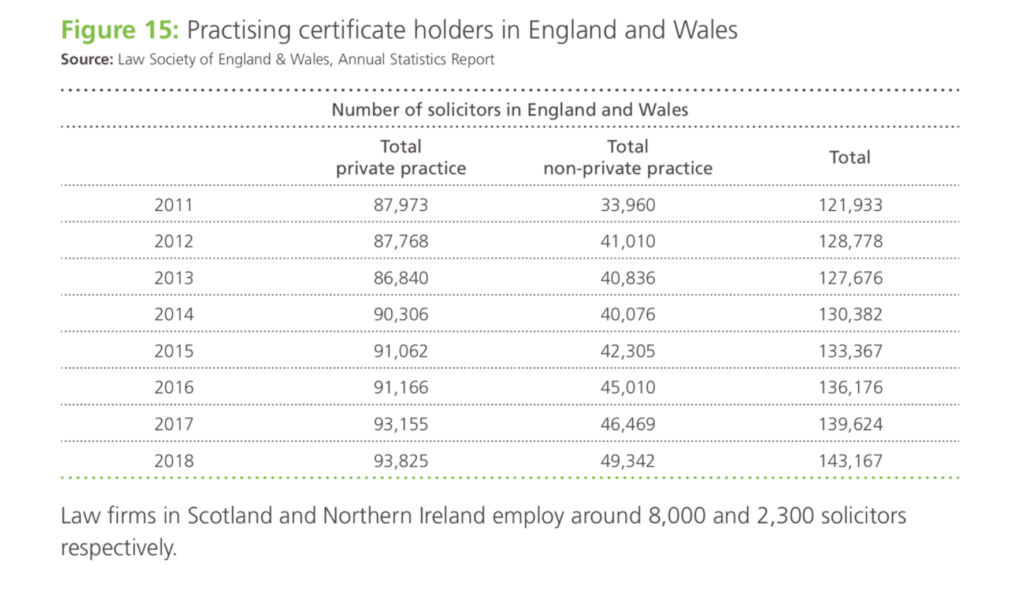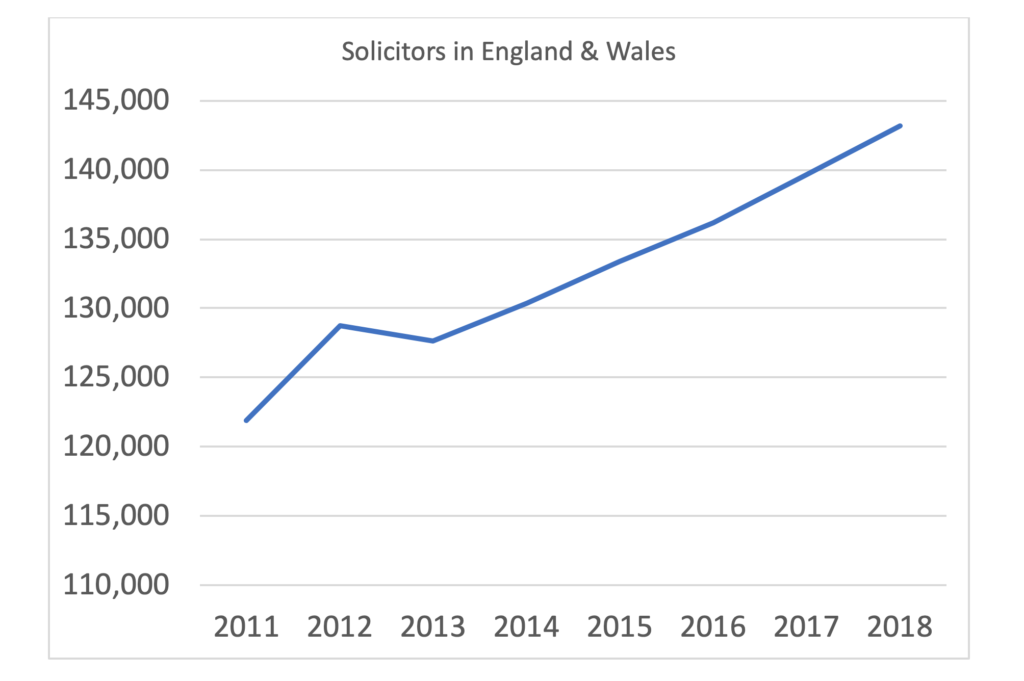
Despite the much discussed theory that as more tech enters the legal profession the number of lawyers will decline, there is no evidence for that – yet. In fact, the most recent data shows that, in a market such as the UK – which is well-known for tech adoption – the number of lawyers continues to climb at a healthy rate.
In a new report by TheCityUK on the current state of the legal sector, the data shows that the number of lawyers in the UK is steadily expanding – despite the Baby Boom era lawyers now heading for retirement.

For example, the number of solicitors in England & Wales grew from 121,933 back in 2011, to 143,167 just seven years later in 2018. I.e. that’s an increase of over 21,000 lawyers in total, regardless of how many have left the profession due to retirement.
And, it’s worth noting, this is not people who just have some form of legal qualification whether from a law school or elsewhere, this is people with actual practising certificates, i.e. regulated solicitors who are working.
In fact, when numbers dropped this was in 2012/2013, following the earlier impact of the financial crisis on the number of new lawyers going through the training system. After that, things picked up again.

From around 2016 we started to see a growing number of law firms making use of automation technology in the work they do. If this is having an impact then it is not passing through to those who are qualified lawyers.
As a recent piece of research by the Law Society shows, where jobs will be lost is in areas such as secretarial support. And that makes sense. It’s a long term trend that began many years ago.
Now, it’s important to note that the legal sector is slow to show the impact of change in the market and wider economy. This is due to several reasons, one of which is the lagging aspect of ongoing work needs, i.e. there is always so much in the pipeline that even a sudden drop in economic growth in the wider economy is not immediately felt. But…eventually systemic effects are felt.
The question is, after several years of law firms adopting new tech, that in some cases actually performs some very narrow aspects of process level legal work – although still needing plenty of human input – will this eventually pass through the system and lead to a reduction in the demand for qualified lawyers?
Perhaps expecting an impact by 2018 is too soon? Maybe when we get to, let’s say, 2025, then there will be some impact? But, a betting person would likely wager the total number of lawyers will still be higher than it is today.
Which raises another question: how is this possible? The UK economy has had anaemic growth since the financial crisis of 2008/2009. In 2016 the UK voted for Brexit – which was hardly a help economically. We have seen a decline in house sales – a mainstay of consumer level legal work. And, we have seen the steady uptake of more tech that saves time and in some very narrow areas sucks up what could be seen as billable legal activity.
But, still the number of lawyers rises.
Some thoughts:
- Overall legal needs are only becoming more complex. Regulation keeps adding new issues to handle. And even things like Brexit in fact only add more legal demand as people try to prepare for a huge shakeup.
- UK-based companies continue to grow in size, enter new markets and face new legal challenges.
- Tech is mostly impacting areas where there is little to do with specific legal work. The trend to have less PAs per lawyer has been going on for years, and more tech only accelerates it.
- Although now dozens of larger commercial law firms are making use of semi-automated doc review systems, doc automation templates, and other applications, its overall impact is clearly minimal and there is still enough demand for those law firms to keep their qualified staff very busy.
- Where we may – one would assume – see a reduction is among paralegals, i.e. the front line of legal process work. Yet, the LPO, ALSP, law company, Flexi-legal support services seem to be in great health – perhaps the greatest health they have ever been in.
Conclusion: for now, legal technology appears not to be having any notable impact on the total numbers of lawyers. Will that change in the next few years? Possibly. That cannot be discounted.
But, legal markets appear to be incredibly resilient over the long term. And this is due to the point above, legal needs rarely ever stop growing.
P.S. one other thing to note is the growth of inhouse legal teams, which have grown faster than the total of lawyers in private practice.
Interestingly, in-house legal teams tend to use less strategic level tech than their private practice cousins. So, one could see a trend of lawyers moving to environments where less tech is used inside the office….